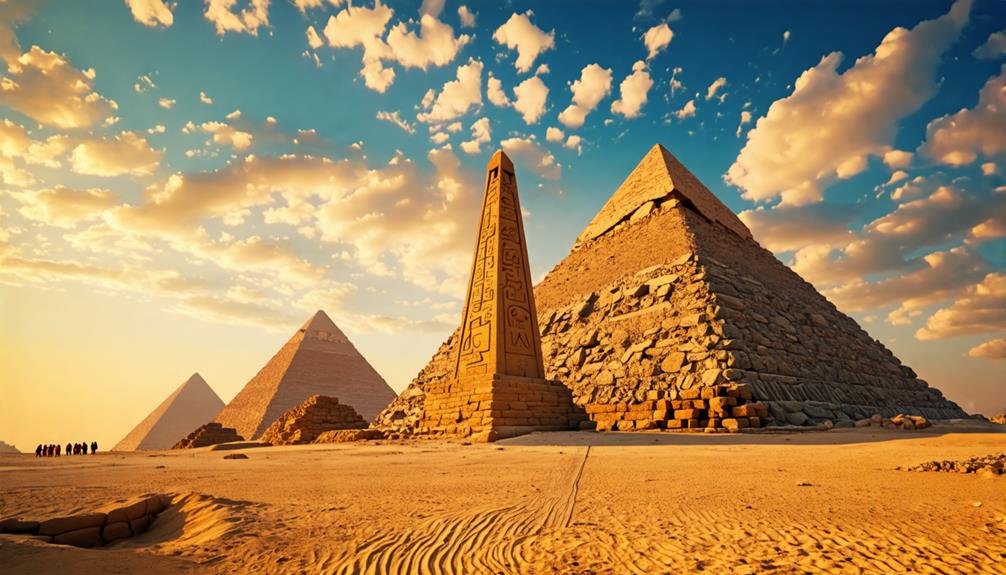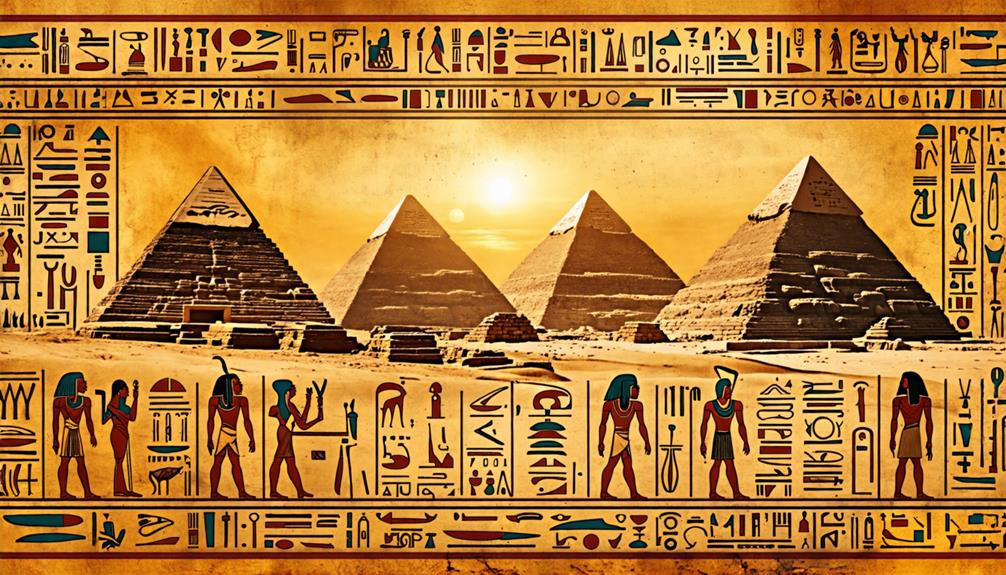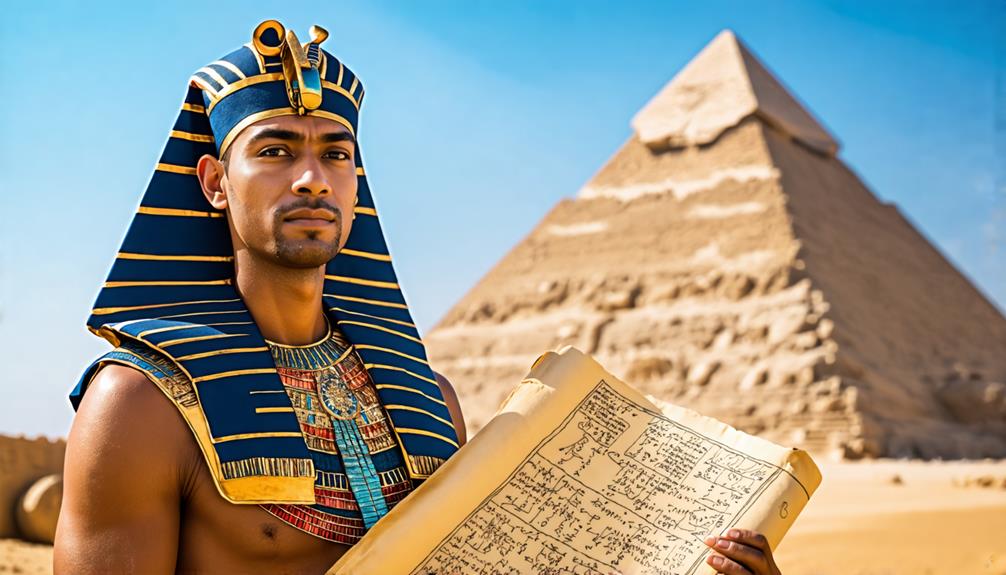Imagine a world where the ancient Egyptians developed advanced mathematics like the Greeks. This alternate history scenario could have led to architectural marvels that surpass even the Great Pyramid of Giza in precision and grandeur.
But the implications of this hypothetical situation extend far beyond architecture. If the Egyptians had possessed advanced mathematical knowledge, it could have potentially reshaped the course of human civilization as we know it.
Architectural Wonders

Had the ancient Egyptians developed more sophisticated mathematical concepts like the Greeks, it's possible that their architectural achievements would have been even more precise and grandiose. One theory is that this advanced understanding could have led to the creation of monuments that pushed the boundaries of what was possible with ancient engineering and construction techniques.
It's worth noting that similar advancements in mathematics and architecture were made by other civilizations at later dates, such as the Greeks and Romans. These civilizations built upon the knowledge of earlier cultures, including the Egyptians, to create their own impressive structures and further develop mathematical concepts.
Scientific Breakthroughs
In an alternate reality where ancient Egyptians made even greater scientific breakthroughs, their hypothetical advanced mathematics could have led to a faster pace of technological development.
One theory is that this would have resulted in a more rapid spread of knowledge and innovation across the ancient world, potentially leading to earlier advancements in fields like engineering, navigation, and architecture.
It's possible that these discoveries could have meant significant changes to the course of human history, with civilizations achieving milestones like long-distance travel, complex machinery, and advanced construction techniques much earlier than in our timeline.
However, it's worth noting that similar breakthroughs were made by other civilizations at later dates, such as the Greeks and Arabs, who built upon the foundations laid by the Egyptians and other ancient cultures.
Philosophical Insights

In this alternative history scenario, ancient Egyptians developing a strong philosophical tradition could have led to various outcomes. One possibility is that their rigorous, logic-based approach might've accelerated humanity's understanding of reality, knowledge, and ethics by centuries.
However, it's also conceivable that Egyptian philosophy, deeply intertwined with their unique religious beliefs and societal structures, may have remained relatively insular.
Interestingly, aspects of this hypothetical Egyptian philosophy bear similarities to the later work of Greek thinkers like Aristotle and Pythagoras, who were profoundly influenced by their stays in Egypt. Had the Egyptians established a robust philosophical framework earlier, it might've provided an even sturdier foundation for subsequent Hellenistic and Islamic Golden Age philosophy to build upon.
Ultimately, whether this alternate historical path would have dramatically altered the course of human thought is a fascinating question left to the reader's speculation.
Astronomical Advancements
Had the ancient Egyptians further developed their astronomical knowledge, they might've made groundbreaking discoveries centuries before the Greeks.
One theory is that they'd have accurately calculated the Earth's circumference and even posited that it orbits the Sun, not the other way around.
These ideas did emerge later, with Greek astronomers like Eratosthenes measuring the Earth's size and Aristarchus proposing a heliocentric model.
However, if the Egyptians had reached these conclusions first, it could have meant a major shift in how subsequent civilizations viewed the cosmos and our place in it.
Technological Innovations

In an alternate history, the ancient Egyptians' technological innovations could have led to a significantly different world. One theory is that their advanced irrigation systems might've spread to other civilizations, transforming arid regions into agricultural powerhouses and potentially altering the balance of power in the ancient world.
The precision of their engineering and craftsmanship techniques could have accelerated the development of architecture and artistry in subsequent civilizations.
If these innovations had been lost or suppressed, it's possible that similar breakthroughs might've emerged centuries later during the Islamic Golden Age or the European Renaissance. The impact on human development would have depended on the timing and context of their re-emergence.
Cultural Impact
In an alternative history where the ancient Egyptians' mathematical worldview permeated their culture more deeply, it's possible that their religion and mythology would have taken on a more quantitative and structured nature. One theory is that this could have led to a more deterministic outlook, with Egyptians seeing their lives and fates as governed by immutable mathematical principles.
It's conceivable that this perspective might've shaped Egyptian art as well, with geometric patterns and mathematically-derived proportions featuring even more prominently.
If this quantitative culture had persisted, it could have meant changes to fields like philosophy, with logic and reason potentially playing a larger role in Egyptian thought.
While the ancient Egyptians were pioneering in many aspects of mathematics, it's worth noting that other civilizations, like the ancient Greeks and later Islamic scholars, also developed advanced mathematical concepts that influenced their cultures.
Had they followed a similar path to this hypothetical Egyptian scenario, we might've seen parallel cultural impacts in their societies.
Conclusion
If you let your imagination run wild, it's clear that the Ancient Egyptians could've revolutionized human history had they developed advanced mathematics like the Greeks.
Their towering pyramids would've reached even greater heights, their philosophical musings would've echoed through the ages, and their scientific breakthroughs would've catapulted them light years ahead.
The impact on subsequent civilizations is immeasurable, leaving us to wonder what could've been if they'd only released the full potential of mathematics.

Leave a Reply